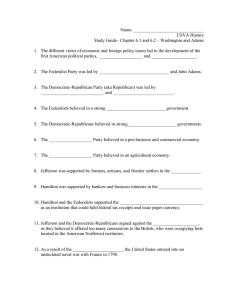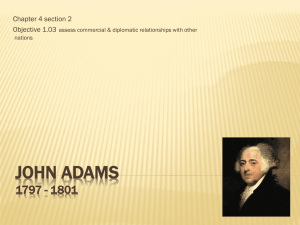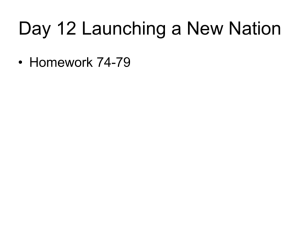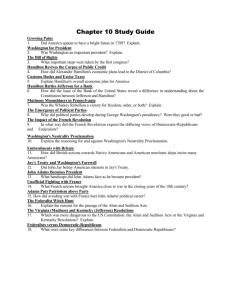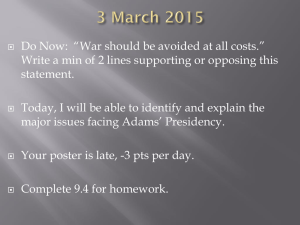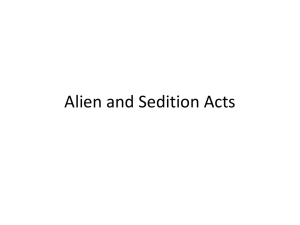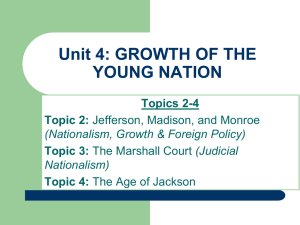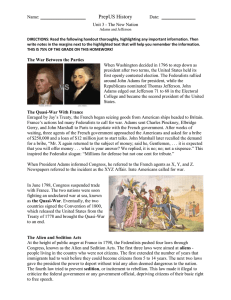America under Adams and Jefferson Unit 3, Lesson 3
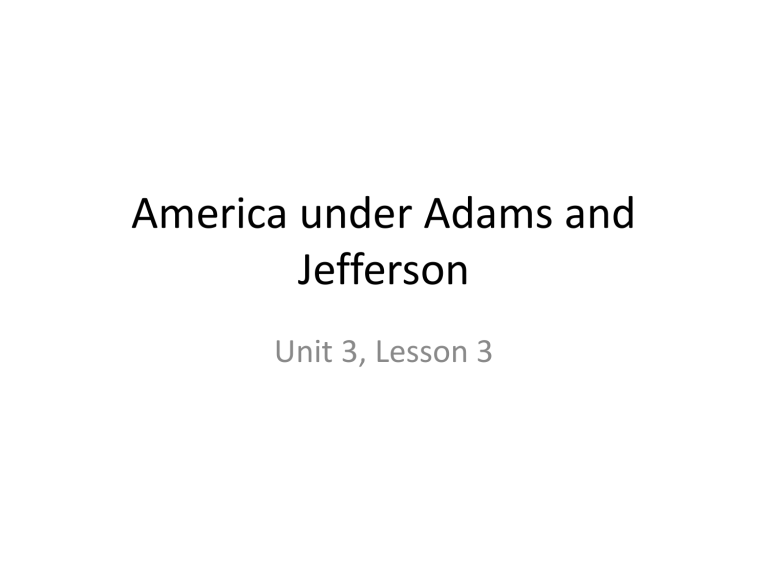
America under Adams and
Jefferson
Unit 3, Lesson 3
Essential Idea
• Despite Washington’s warnings, political and foreign policy problems continued under
Adams and Jefferson.
Washington’s Farewell Address
• Themes:
• 1. Danger of Sectionalism
• Sectionalism- loyalty only to the needs of one’s own area of the country
• Washington called for national unity, saying Americans should care about the country as a WHOLE
• 2. Danger of Political Parties
• Warned that political parties divided the country
• Political parties seek power and lead to corruption
• 3. Danger of Foreign Alliances
• America should ONLY trade with other countries
• Alliances with other countries could pull America into wars
Washington’s
Legacy
• Washington helped strengthen the federal government
• He served only two terms and retired, setting an example for future presidents
• He established a foreign policy of neutrality, which the country tried to follow
• Review of Washington
Election of 1796
• Election of 1796:
• President- John Adams, a Federalist
• Vice-President- Thomas
Jefferson, a Democratic
Republican
Trouble Continues with Europe
• Events during Adams’ Presidency
• XYZ Affair:
• France, angry with Jay’s Treaty, started capturing American ships too
• Adams sent diplomats to France, hoping to avoid war
• XYZ Affair- three French agents, X,Y, and Z, demanded a $250,000 bribe from the American diplomats just to negotiate
War with France?
• Quasi-War:
• Americans were furious over the XYZ Affair and Federalists called for war
• America began capturing French ships
• Quasi-War- no official war declared, American and French ships fired on each other at sea
• Convention of 1800- in this treaty, America and France agreed to peace and avoided war
Alien and Sedition Acts
• Alien and Sedition Acts:
• Federalists used anger at
French to pass laws hurting
French immigrants and
Democratic-Republicans
• Alien Acts- attacked French immigrants, made it harder to become a citizen and easier to be deported
• Sedition Act- made speaking or writing against the government illegal
Fighting in Congress
• Effect of Alien and Sedition Acts:
• These laws were a “power grab” for Federalists
• The French, who voted for Democratic-Republicans, were attacked
• Criticizing the Federalist-controlled government was illegal
• Why didn’t the Supreme Court stop this?
Virginia and Kentucky Resolutions
• Virginia and Kentucky Resolutions:
• The STATE governments of Virginia and Kentucky passed resolutions
(official statements) against the Alien and Sedition Acts
• They called the acts unconstitutional and pushed the idea of nullification
Nullification
• Nullification- the idea that states can reject federal laws they find to be unconstitutional
• Future Impact:
• This set the precedent of states challenging the federal government’s power
• The main cause of the Civil War was southern states “nullifying” the federal government and seceding (breaking away)
• The Issue of Federal Power
• Election of 1800:
• Anger at Federalist actions caused
Americans to vote for Democratic-
Republicans
• Dirty Politics
• Thomas Jefferson and Aaron Burr tied for the most votes
• The House of
Representatives was responsible for choosing the president
Election of 1800
Deals in the House
• Deals in the House:
• Alexander Hamilton got Jefferson to promise to support the BUS (Bank of the
United States)
• In return, Hamilton got the House to vote for Jefferson, who became president
The “Revolution of 1800”
• Significance of Election of 1800:
• Also called the “Revolution of 1800,” it showed that power could be PEACEFULLY transferred between parties (rare at the time)
• Tension between Hamilton and now vice-president Burr later led to a duel
• The Election of 1800
The Duel
• The Duel:
• In 1804, Burr challenged Hamilton to a duel
• Burr shot and killed Hamilton
• Aaron Burr
Federalists Try to Cling to Power
• Events during Jefferson’s
Presidency
• Before Jefferson took office, John Adams tried to keep Federalists in power
• Adams appointed lastminute Federalists judges to fill the judicial branch
• This would limit
Democratic-Republican power
Marbury v. Madison
• Democratic-Republicans blocked the appointments of the “midnight judges”
• Marbury v. Madison-
Supreme Court ruled part of Judiciary Act of 1789 unconstitutional and thus invalid
• This case established
JUDICIAL REVIEW, the authority of the Supreme
Court to rule government laws or actions as unconstitutional
The Louisiana Purchase
• Spain gave France the Louisiana Territory in 1800
• Jefferson still wanted American access to New
Orleans and the Mississippi River
The Louisiana Purchase
• Terms:
• Napoleon sold America the entire Louisiana
Territory for only 15 million dollars
• America OWNED New
Orleans and the
Mississippi River, great for trade
• America’s size DOUBLED, including millions of acres of farmland
Constitutional?
• Constitutional?
• Jefferson went against his strict interpretation/ constructionist philosophy
• He bought the Louisiana
Territory without authority from the
Constitution
• The Louisiana Purchase
Exploring the West
• Lewis and Clark Expedition:
• Congress secretly funded the expedition (the “Corps of Discovery”) to explore the
Louisiana Territory
• The PRIMARY mission was to find a water route to the Pacific Ocean for trade
Lewis and Clark
• They also conducted scientific research and made contact with many Indian tribes
• Sacagawea served as an Indian guide and interpreter
The “Corps of Discovery”
• Results:
• No water route was discovered (it did not exist)
• Many new plants and animals were discovered
Manifest Destiny
Foreshadowed
• The expedition boosted American claims to the
Oregon Territory (more on this later)
• Americans increasingly began to move to the West
• Lewis and Clark Expedition
